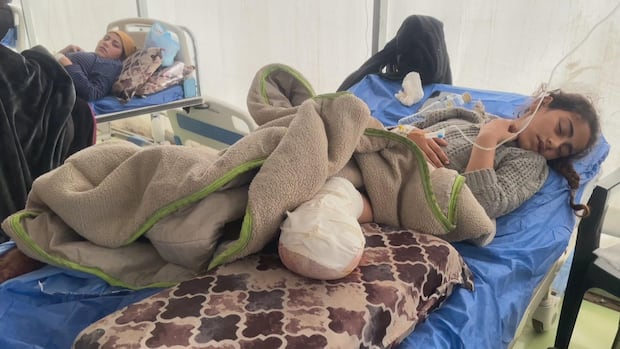‘We could barely walk,’ sisters say after being ordered to evacuate northern Gaza’s last major hospital
Sisters Hind and Heba Al-Hourani were being treated at Al-Ahli Arab Baptist Hospital on Sunday when Israel ordered everyone in the building to evacuate in the middle of the night, before targeting the hospital.
“All of a sudden, [it felt like] everyone ran out and was going to leave us behind,” said Hind, 9, whose left leg had been amputated in an earlier airstrike that also left her sister critically wounded. “We ended up rushing to the street. We were scared.”
Heba said once they got out onto the street, they didn’t know where to go.
“We were praying in the streets, we could barely walk or do anything with our wounded legs,” Heba said. “It was a very difficult situation, very frightening.”
Al-Ahli Arab Baptist Hospital, the last major hospital providing critical care in northern Gaza, has been forced to close after Israeli strikes severely damaged its emergency department. The strike is one of the latest hits on Gaza’s devastated health-care infrastructure, and comes as international humanitarian organizations say hospital supplies are running out, with no new aid entering the territory for more than seven weeks.

Hind and Heba’s aunt, Afaf Al-Hourani, said as soon as they were told to evacuate, they grabbed mattresses and tried to get the wounded patients out of the building.
“The girls were screaming in the streets … Hind was screaming, because she was in pain, so we put her onto her sister’s mattress and pulled them onto the street,” Al-Hourani said.
“We were calling on others to help us pull them through the rubble on the streets.”
Hind, an amputee, and her sister Heba Al-Hourani were among hundreds of wounded patients forced to evacuate Al-Ahli Arab Baptist Hospital overnight on Sunday after Israel warned it would strike the building. Israel alleged it held a Hamas command and control centre, without providing evidence. Hamas denies the allegation.
Hospital closure means less urgent care available
Al-Hourani said other people helped them reach the Red Crescent Field Hospital, about 600 metres away from Al-Shifa Hospital in Gaza City, roughly one kilometre away, where they were able to get treatment.
Israel said it targeted a Hamas command and control centre within Al-Ahli hospital, without providing evidence, an allegation it has used in past strikes on hospitals in Gaza. Hamas has denied the allegations.
The Episcopal Diocese of Jerusalem, which runs the hospital, said the warning to evacuate came 20 minutes before the airstrike. On Sunday, it called on the international community to intervene to “stop all kinds of attacks on medical and humanitarian institutions.”

Gaza’s Health Ministry said one patient, a girl, died during the evacuation because staff were unable to provide urgent care.
Fadl Naeem, director of the Al-Ahli hospital, said its emergency department was treating roughly 300 people each day. Naeem said the hospital’s lab and X-ray departments have also been shuttered in the aftermath of the attack.
He told CBC News on Monday there are plans to re-build, which could take weeks or months, but no new humanitarian supplies have entered the Palestinian enclave since Israel blocked the entry of aid trucks on March 2, as talks stalled on the next stage of a now-broken truce between Israel and Hamas.
Medical supplies running critically low
Afaf Al-Hourani said her nieces’ conditions worsened due to the lack of medicine in Gaza. Hind and Heba were critically wounded by an Israeli airstrike in Gaza City that killed their brother earlier this month.
“If the crossings were open and [Israel] would allow for medicine to be let in for the wounded, then they wouldn’t be in pain,” said Al-Hourani.
An Israeli air strike has destroyed part of Al-Ahli Arab Hospital, the last fully functional hospital in Gaza City. Witnesses said the strike destroyed the intensive care department of the hospital.
On Friday, Red Cross president Mirjana Spoljaric told Reuters that medical supplies in the enclave are running critically low.
“We are now finding ourselves in a situation that I have to describe as hell on Earth…. People don’t have access to water, electricity, food, in many parts,” Spoljaric said, warning that its field hospital is expected to run out of supplies within two weeks.
Dr. Hassan Al-Shaer, medical director of Al-Shifa Hospital in Gaza City, said the facility received around 50 patients who evacuated Al-Ahli on Sunday.
“We have a limited number of beds here and a limited number of services,” Al-Shaer told CBC News on Tuesday. “It was very difficult to receive them.”
The hospital, which at one point was Gaza’s largest medical complex and central hospital, has less than 100 beds available for patients, down from some 700 beds before the 18-month-long war.
UN chief ‘deeply alarmed’ at hospital strike
A spokesperson for United Nations Secretary-General António Guterres said he is “deeply alarmed” at Sunday’s strike by Israeli forces on the Al-Ahli hospital.
“Under international humanitarian law, wounded and sick, medical personnel and medical facilities, including hospitals, must be respected and protected,” the UN chief’s spokesperson said.
He said the attack dealt “a severe blow to an already devastated health-care system in the [Gaza] Strip.”
The Israeli military has struck and raided hospitals on several occasions during the 18-month war, accusing Hamas militants of hiding out in them or using them for military purposes. Hospital staff have denied the allegations and accused Israel of recklessly endangering civilians and destroying its health-care infrastructure.

On Tuesday, an Israeli airstrike hit the northern gate of the Kuwaiti Field Hospital in the Muwasi area, killing a medic and wounding nine other people.
The wounded were all patients and medics, and two of the patients were in critical condition after the strike, said Saber Mohammed, a hospital spokesman.
There was no immediate comment from the Israeli military.
More than 51,000 Palestinians have been killed in the Israeli offensive in Gaza, Palestinian officials say. That includes more than 1,600 people killed since Israel ended a ceasefire and resumed its offensive last month to pressure Hamas to accept changes to the agreement.
Gaza’s Health Ministry does not say how many were civilians or combatants, but says women and children make up more than half of the dead.
Israel began its assault after thousands of Hamas-led gunmen attacked communities in southern Israel on Oct. 7, 2023, killing 1,200 people and abducting 251 as hostages, according to Israeli tallies. Fifty-nine hostages are still inside Gaza, 24 of whom are believed to be alive.















Post Comment